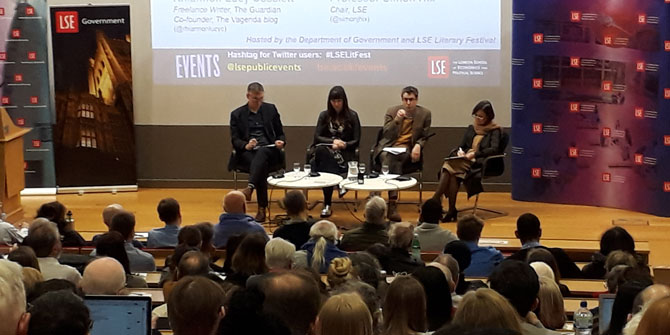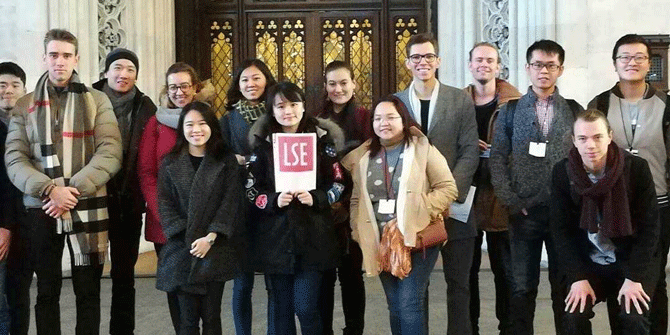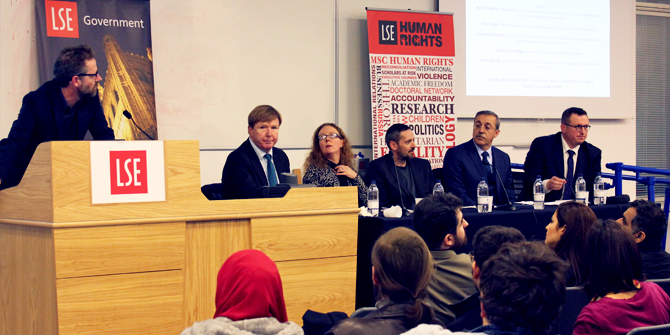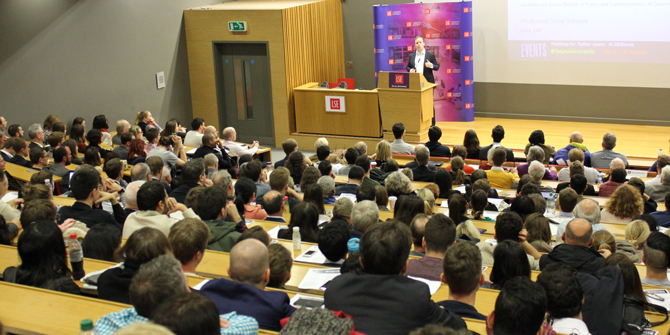MSc Public Policy and Administration student Hassan Burke reflects on the ‘Was Brexit a Populist Revolution?’ LSE Literary Festival 2017 event, which took place on Tuesday 21 February.
Listen to the podcast recording of the event.
The political upheaval experienced the world over in recent months and years is surely, at this point, old news. Political turmoil may just be the new normal -or so we are told. If it seems sometimes that the news has provided a steady drip feed detailing the rise and perseverance of strident populist, anti-establishment, nationalist movements in near all corners of the globe, rocking the global order to its core, one might not be mistaken. A quick glance at the search popularity of the term “populism” using Google Trends reveals something quite striking. Uniformly flat over the previous four years, the graph illustrates a sudden jump to a four-year peak during what might be a very recognisable time: between June 12 and July 10, 2016.
The 23rd of June, 2016 was my 24th birthday. It also happened to be the date of the UK’s EU Referendum, perhaps to be remembered in yet unwritten history textbooks as the country’s most significant political moment in a generation. The resulting shockwave of the British public’s decision to withdraw from the European Union conceivably cemented a narrative of a global populist uprising. Elections from the Netherlands to the Philippines, and France to the United States do appear to suggest a moment of escalating anti-establishment furore. But is “Brexit”, notably different on some dimensions, truly part of this wave? In conjunction with the LSE’s Literary Festival, the LSE Department of Government brought in distinguished guests to tackle this very question.
Neither Populist nor a Revolution?
A debate certainly cannot be called as such if all participants are in agreement. So it was that the three panellists disagreed with the fundamental question at hand: was Brexit a populist revolution? Professor James Tilley, Professor of Politics at the University of Oxford, made his case that Brexit should neither be described as populist, nor a revolution, using that favourite tool of the academic: empirical evidence. Attitudes towards the economic benefits of EU membership, towards immigration, and towards national sovereignty were the three key variables predicting an individual’s vote in the referendum, according to Tilley. However, controlling for these variables, one finds in polling data only very small differences in voting intention between respondents who say they do trust politicians and those who say they do not. The outcome of the referendum could not then, he argued, be considered to be driven primarily by anti-elite and anti-establishment sentiment –a crucial component of his working definition of populism. Furthermore, with levels of Euroscepticism between Britain’s social classes appearing to have changed very little in the past 30 years, what occurred was not a revolution. Rather, Brexit was merely a case of direct democracy unleashing the long-harboured attitudes of the British public which were formerly dammed by the workings of party politics.
Overturning the Existing Order
This argument found few supporters among Tilley’s fellow panellists. Though agreeing that party politics disguised the Euroscepticism rift, Mary Dejevsky, writer and broadcaster for The Independent newspaper, found the Brexit vote exhibits quite obvious tell-tale signs of an anti-establishment revolt. According to Dejevsky, the deep fissures along class lines revealed by the referendum do, in fact, reflect an anti-elite feeling – going as far to draw comparison with 1917 Bolshevik revolution in Russia; the difference being that the context of 21st century democratic UK institutions forced this very British revolution to take a (thankfully) much milder form. “People like us”, she said, referring to the well-educated, cosmopolitan middle and upper-classes, had always arranged the order such that they benefited from political decisions. Now, with Brexit, these “people like us” woke on the morning of June 24th to find the existing order overturned and a new, much different arrangement shaped by those who had previously been left out.
A Populist Marketing Campaign
Rhiannon Lucy Cosslett, freelance writer for The Guardian and co-founder of the Vagenda blog, pointed to the Leave campaign’s clarion call of “taking our country back!” to be enough for one to at least suspect populist underpinnings. It does certainly ring a bell when considering slogans of other populist movements and campaigns, perhaps most notably today the ubiquitous “Make America Great Again” of Donald Trump’s successful US presidential run. The EU Referendum was, in her view, not wholly about EU membership to many voters. Instead, it was more a vessel through which underlying social and economic fault lines, including the impact of austerity policies, disaffection with the status-quo in Westminster, and racism and xenophobia were able to express themselves in policy change. Rather than a revolution, however, Cosslett described the movement to exit the European Union –backed by the disaffected working class but led by members of the established elite- to be more of a “populist marketing campaign”. The journalist garnished her claims with poignant anecdotes, including a friend’s interaction with a voter who claimed to have voted to leave the EU because she lived in a safe Labour seat and wished to clearly express her dissent with the status-quo -a clear signal of voter disaffection with the establishment.
Whether populist, a revolution, both, or neither, the significance of the EU Referendum clearly loomed large in the minds of all panellists. In the audience question and answer session, the three guests and moderator Professor Simon Hix, Harold Laski Professor of Political Science in the Department of Government, fielded varied questions ranging from the vote’s possible effects on the prospect of Irish reunion to the strategies of the major parties and whether they will be drawn to the populist right, signalling the likely far-reaching consequences of this milestone in modern British political history. We may expect to hear much more of this and similar debates in the future, while this tumult is -or appears to be- the new normal.
 Hassan Burke is an MSc Public Policy and Administration student in the LSE Department of Government. His academic interests include fiscal and economic policy, migration, and comparative political economy. In his free time he enjoys playing and watching sports, listening to podcasts, and exploring London.
Hassan Burke is an MSc Public Policy and Administration student in the LSE Department of Government. His academic interests include fiscal and economic policy, migration, and comparative political economy. In his free time he enjoys playing and watching sports, listening to podcasts, and exploring London.
Note: this article gives the views of the author, and not the position of the LSE Department of Government, nor of the London School of Economics.






